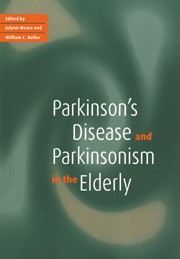Book contents
- Frontmatter
- Contents
- List of contributors
- Foreword
- 1 A glossary of terms
- 2 Diagnosis of parkinsonism in the elderly
- 3 Parkinson's disease and parkinsonism in the elderly
- 4 Drug-induced parkinsonism in the elderly
- 5 Essential tremor in the elderly
- 6 Gait apraxia and multi-infarct states
- 7 The epidemiology of Parkinson's disease and parkinsonism in elderly subjects
- 8 Health and social needs of people with Parkinson's disease and the worldwide organization of their care
- 9 The drug treatment of Parkinson's disease in elderly people
- 10 Rehabilitation in Parkinson's disease and parkinsonism
- 11 Rehabilitation, nursing and elderly patients with Parkinson's disease
- 12 Rehabilitation, physiotherapy and elderly patients with Parkinson's disease
- 13 Rehabilitation, occupational therapy and elderly patients with Parkinson's disease
- 14 Rehabilitation, speech and language therapy and elderly patients with Parkinson's disease
- Index
14 - Rehabilitation, speech and language therapy and elderly patients with Parkinson's disease
Published online by Cambridge University Press: 24 November 2009
- Frontmatter
- Contents
- List of contributors
- Foreword
- 1 A glossary of terms
- 2 Diagnosis of parkinsonism in the elderly
- 3 Parkinson's disease and parkinsonism in the elderly
- 4 Drug-induced parkinsonism in the elderly
- 5 Essential tremor in the elderly
- 6 Gait apraxia and multi-infarct states
- 7 The epidemiology of Parkinson's disease and parkinsonism in elderly subjects
- 8 Health and social needs of people with Parkinson's disease and the worldwide organization of their care
- 9 The drug treatment of Parkinson's disease in elderly people
- 10 Rehabilitation in Parkinson's disease and parkinsonism
- 11 Rehabilitation, nursing and elderly patients with Parkinson's disease
- 12 Rehabilitation, physiotherapy and elderly patients with Parkinson's disease
- 13 Rehabilitation, occupational therapy and elderly patients with Parkinson's disease
- 14 Rehabilitation, speech and language therapy and elderly patients with Parkinson's disease
- Index
Summary
Introduction
Speech and swallowing problems are common in elderly subjects with Parkinson's disease (PD). Patients and carers frequently cite communication difficulties as causing the greatest disability and handicap in PD (Oxtoby 1982). In one study around 70% of patients with PD complained of impairment of speech and voice and 41% reported difficulty with chewing and swallowing (Hartelius and Svensson 1994) and another study reported speech problems in over 60% of patients studied (Gibberd et al. 1985). Dysphagia has been reported in 15–50% of patients with PD, with abnormalities on barium swallow being demonstrated in up to 95% of cases studied (Bramble et al. 1976, Robbins et al. 1986, Lieberman et al. 1980). A survey carried out by the Parkinson's Disease Society of the United Kingdom (UK) found that 40% of the PD patients contacted complained of drooling and 26% had difficulty swallowing (Oxtoby 1982). Aspiration pneumonia as a result of dysphagia is a common terminal event in late stage PD.
Despite the high prevalence of communication and swallowing problems very few patients with PD get referred to speech and language therapists (Oxtoby 1982, Mutch et al. 1986). Mutch et al. (1986) found that although 65% of patients in their study reported difficulties with speech less than 5% had been assessed by a speech and language therapist. A developing body of evidence exists supporting the efficacy of speech therapy in PD (Scott and Caird 1983, Robertson and Thomson 1984, Scott et al. 1985, Johnson and Pring 1990).
- Type
- Chapter
- Information
- Parkinson's Disease and Parkinsonism in the Elderly , pp. 226 - 239Publisher: Cambridge University PressPrint publication year: 2000



